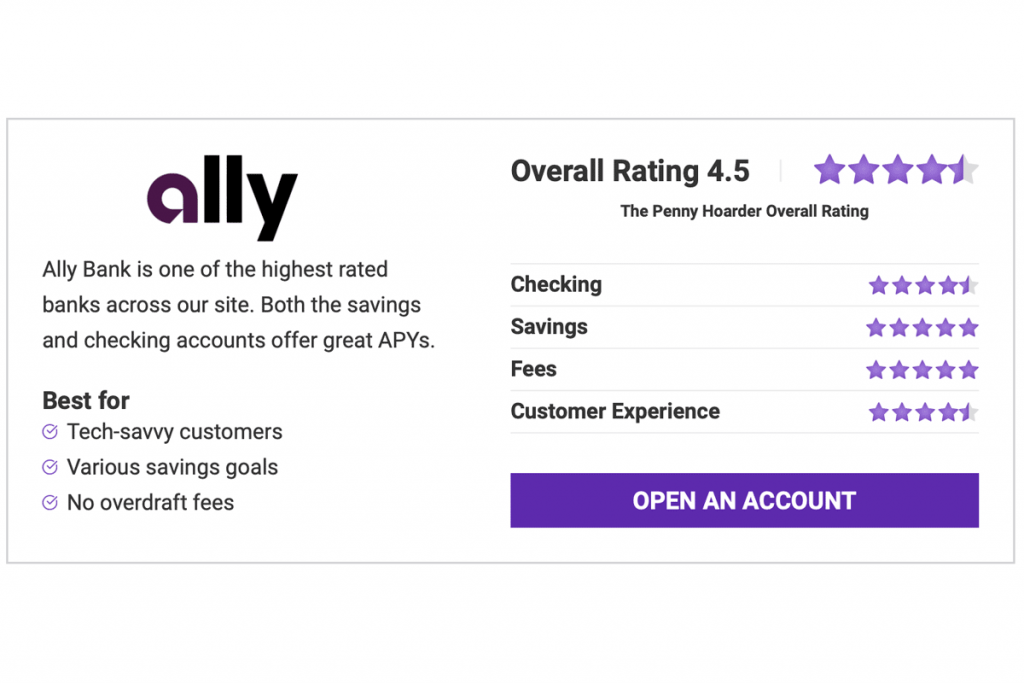A certificate of deposit — CD for short — is a low-risk savings account that holds a fixed amount of money for a certain time, such as six months, one year or five years.
During that time, your deposit earns a fixed interest rate. Usually, the longer the term, the higher the interest rate.
When the CD term is up, you receive your initial deposit back plus the interest earned.
Unlike a savings account, CDs typically don’t let you withdraw money whenever you want. CD accounts require you to leave funds untouched for a fixed period or else face an early withdrawal penalty.
These penalties usually range from three months of interest to one year worth of interest, depending on the term length.
You can buy a certificate of deposit from a bank or credit union. Bank CD accounts are insured by the Federal Deposit Insurance Corporation (FDIC) up to $250,000 — just like savings accounts and money market accounts.
Credit unions issue share certificates, which are the credit union equivalent of CDs. These are also insured for up to $250,000, but by the National Credit Union Administration (NCUA) instead of the FDIC.
CD vs. Savings Account: Which Is Better?
If you’re debating between a certificate of deposit or a savings account, ask yourself this question: Do you care more about interest rates or access to your money?
A CD account usually earns a higher annual percentage yield (APY) than what you usually find in a high-yield savings account — but your money is harder to access.
If you need easier access to your funds, a savings account is a better option.
But a traditional savings account doesn’t earn much interest. In fact, the national APY for savings accounts is just 0.33%.
So if you’re saving for a short-term goal and want to earn as much interest as possible, a certificate of deposit is likely a better choice than a savings account.
Opening a CD makes sense when you are free of credit card debt and already have an emergency fund built up in your savings account.
Best CD Rates Compared
| Bank | Best for | APY | Minimum Opening Deposit | Term Length | |
|---|---|---|---|---|---|
| Marcus by Goldman Sachs | No-penalty CDs | 3.75%- 4.40% | $500 | 6 months to 6 years | SEE DETAILS |
| Discover Bank | CD laddering | 1.50% – 4.40% | $2,500 | 3 months to 10 years | SEE DETAILS |
| Ally Bank | Bump rate CDs | 2% – 4.35% | $0 | 3 months to 5 years | SEE DETAILS |
| Synchrony Bank | Rate guarantee | 2.25% – 4.60% | $0 | 3 months to 5 years | SEE DETAILS |
| Capital One | No minimum balance requirement | 3.30% – 4.40% | $0 | 6 months to 5 years | SEE DETAILS |
| PenFed Credit Union | 18-month and 2-year CDs | 2.0% – 4.35% | $1,000 | 6 months to 7 years | SEE DETAILS |
| Bread Savings | High APYs | 1.75% – 2.55% | $1,500 | 1 year to 5 years | SEE DETAILS |
| Quontic Bank | 6-month CDs | 3.50% – 4.45% | $500 | 6 months to 5 years | SEE DETAILS |
Marcus by Goldman Sachs
Best for no-penalty CDs
Key Features
- Above-average CD rates
- $500 minimum deposit
- Various term lengths
Marcus by Goldman Sachs consistently offers some of the best CD rates on the market. It’s one of the few online banks that offers a no-penalty CD option, including seven-month, 11-month and 13-month CD accounts. Term lengths for high-yield CDs range from six months to six years. Marcus by Goldman Sachs also offers a 10-day rate guarantee on CDs.
Marcus by Goldman Sachs
Annual Percentage Yield (APY)
3.75% – 4.40%
Term Length
6 months to 6 years
Minimum Deposit
$500
Additional Details
Marcus by Goldman Sachs offers competitive CD interest rates with terms ranging from six months to six years.
CD rates range from 3.75% for a 6-month CD to 4.40% APY for an 18 month CD. The $500 minimum deposit requirement is lower than some other banks and credit unions.
The company offers two types of certificates of deposit: a high-yield CD and a no-penalty CD. Term lengths for no-penalty CDs range from seven months to 13 months with 0.45% to 3.50% APY.
Unlike traditional CDs, no-penalty CDs let you withdraw money at any time without paying a fee or losing interest.
Early withdrawal penalties from a standard high-yield CD are as follows: Loss of three months worth of interest on CDs with a maturity date of less than a year, nine months of interest for CD terms of one to five years and a year’s worth of interest for six-year CDs.
Marcus by Goldman Sachs is also well-known for its high-yield savings accounts, which consistently offer above-average interest rates.
Discover Bank
Best for CD laddering
Key Features
- 12 different term lengths
- Competitive CD rates
- IRA CD
Discover Bank offers 12 different CD term lengths — more than many of its competitors. This variety of maturity dates gives customers multiple options for CD laddering. Bank CD terms range from three months to 10 years. The minimum deposit of $2,500 is somewhat high but Discover Bank CD rates are competitive.
Discover Bank

Annual Percentage Yield (APY)
1.50% – 4.40%
Term Length
3 months to 10 years
Minimum Deposit
$2,500
Additional Details
Discover, best known as a credit card company, boasts a strong selection of financial products — including CDs.
Discover Bank CDs are available in 12 term lengths, from three months to 10 years and with APYs ranging from 1.50% to 4.40%.
Numerous CD terms makes it easy for consumers to explore CD laddering options. A CD ladder involves opening multiple CDs with staggered maturity dates. Doing so lets you earn interest while providing easier access to your money.
Another perk: Discover offers CDs for individual retirement accounts (IRA CDs).
We’re not in love with Discover’s $2,500 minimum deposit requirement, which is higher than other online banks and credit unions on this list.
The early withdrawal penalty for Discover CDs ranges from three months of interest for term lengths of one year or less all the way up to two years of interest for CD terms of seven to 10 years.
Like all CDs on this list, there are no monthly fees or opening fees.
Aside from CDs and credit cards, Discover also offers an online savings account and checking account.
Ally Bank
Best for bump rate CDs
Key Features
- No minimum deposit requirements
- Interest compounds daily
- 24/7 customer service
With no minimum deposit requirements, Ally Bank CDs are a great option for new investors. You can also open a CD account in the name of a trust. In addition to several no-penalty CDs and high-yield CDs, Ally offers Raise Your Rate CDs, which give you the option to bump up your CD interest rate if the APY increases during the term without having to wait for the maturity date.
Ally Bank

Annual Percentage Yield (APY)
2%-4.35%
Term Length
3 months to 5 years
Minimum Deposit
$0
Additional Details
Ally Bank, a popular online financial institution, offers a wide variety of online CD types and term lengths. Like many of their financial services, there’s no minimum deposit requirement to open a bank CD.
In addition to its standard high-yield CDs, Ally offers two bump-up CDs, or what the company calls Raise Your Rate CDs.
The APY is a little lower, but you can request one to two rate increases if Ally raises the rate for new CDs with the same term and balance tier as your CD.
That could be appealing as the Federal Reserve increases interest rates throughout 2023.
Ally also offers a no-penalty CD with an 11-month term and a 3.85% annual percentage yield. You can withdraw your full balance and interest any time beginning six days after you fund your account.
Ally is a full-service bank that boasts many financial products including an online savings account, checking account, investment account and more.
Synchrony Bank
Best for rate guarantee
Key Features
- 15-day rate guarantee
- 9 term lengths
- No minimum deposit requirement
Synchrony Bank’s nine online CD term options coupled with a $0 minimum deposit make it ideal for short-term CD laddering. In addition to competitive CD interest rates, Synchrony Bank offers a 15-day rate guarantee — more generous than the 10-day guarantee offered by most banks and credit unions. During this time, you can claim the highest interest rate if the published rate increases.
Synchrony Bank

Annual Percentage Yield (APY)
0.50%-2.6%
Term Length
3 months to 5 years
Minimum Deposit
$0
Additional Details
Synchrony Bank is a financial institution with nine different online CD term lengths ranging from three months to five years. It offers competitive rates on certificates of deposit, from 2.25% for a 3-month term to 4.60% APY for a 14-month term.
There is no minimum deposit requirement, and the company also offers IRA CDs.
Another perk: You get the option of withdrawing the interest earned before the CD’s maturity date without penalty.
Synchrony Bank offers a 15-day rate guarantee on any certificate of deposit, which is longer than the standard 10-day guarantee offered by most banks and credit unions.
During this time, you can claim the highest available fixed interest rate if the published rate increases.
Early withdrawal penalties are as follows: Loss of three months of interest for bank CD term lengths of one year or less, six months of interest for CDs with one- to four-year terms, and one year worth of interest for 5-year CDs.
Synchrony offers other useful tools for savers, including a money market account and a high-yield savings account. However, it doesn’t offer a checking account.
Capital One
Best for no minimum balance requirement
Key Features
- Easy to open
- No minimum deposit
- Competitive rates
Capital One is another credit card company that offers CDs. There’s no minimum deposit and various term lengths are available. You can decide when your bank CD account interest is paid out — either at the end of the term, monthly or annually. If you withdraw money early, you’ll pay between three months to six months worth of interest, which is less than some other banks.
Capital One

Annual Percentage Yield (APY)
3.30%-4.40%
Term Length
6 months to 5 years
Minimum Deposit
$0
Additional Details
Capital One’s $0 minimum deposit requirement and competitive rates on online CDs makes the company an attractive option, especially for customers who already bank with Capital One.
The company offers nine bank CD term lengths, from six months to five years. APYs range from 3.30% to 4.40%.
Early withdrawal penalties are lower than some other online banks and credit unions: Three months of interest for terms of one year or less and six months worth of interest for longer terms.
Aside from CDs and credit cards, Capital One offers checking accounts and savings accounts.
PenFed Credit Union
Best for mid-term CDs
Key Features
- High APYs for 18-month and 2-year terms
- Competitive rates
- Education Savings Certificates
Pentagon Federal Credit Union offers money market certificates — the credit union equivalent of CDs — with high APYs. Its rates for 18-month and 2-year certificates are its highest rates, though early withdrawal penalties can be steep. The credit union also offers Education Savings Certificates. Like most credit unions, you must become a member of PenFed before you can buy a CD.
PenFed Credit Union

Annual Percentage Yield (APY)
2% – 4.35%
Term Length
6 months to 7 years
Minimum Deposit
$1,000
Additional Details
Pentagon Federal Credit Union — PenFed for short — once exclusively served people affiliated with the military. In 2019, the credit union opened its services up to the general public.
PenFed’s money market certificates — the credit union equivalent of CDs — have terms ranging from six months to seven years with annual percentage yields from 2% to 4.35%.
The credit union really stands out for its 3% APY on a seven-year CD — the highest rate of any bank or credit union on this list.
PenFed’s $1,000 minimum deposit requirement is pretty standard for money market certificates with high APYs.
Just to be clear on some credit union jargon: a money market certificate isn’t the same as a money market account. Yields earned on credit union accounts are called dividends instead of interest.
Early withdrawal penalties can be steep. The early withdrawal penalty for its 6-month certificates equals 90 days of dividends earned.
For all other certificate term dates, the early withdrawal penalty means losing one year of dividends or 30% of total dividends that would have been earned if the certificate reached its maturity date.
Aside from CDs, Pentagon Federal Credit Union offers a checking account that earns dividends as well as high-yield savings accounts.
Bread Savings
Best for high APYs
Key Features
- Above average APYs
- Limited term length options
- Interest accrued and compounded daily
Bread Savings is an online bank formerly known as Comenity Direct. It offers five different CDs with term lengths ranging from one to five years. It fetches above average APYs but lacks shorter-term online CD options. CDs are offered through Comenity Capital Bank, which started using the Bread Savings name in April 2022.
Bread Savings

Annual Percentage Yield (APY)
4.5%
Term Length
1 year to 5 years
Minimum Deposit
$1,500
Additional Details
Bread Savings offers competitive online CD rates of 4.50% for each of its terms, which range from one to five years.
It offers fewer term lengths than many of its competitors and its $1,500 minimum opening deposit is higher than most banks or credit unions on this list.
Early withdrawal penalties are as follows: Loss of five months of interest for 1- to 3-year CDs and loss of one year of interest for 4-year CD terms and longer.
Interest for Bread Savings CDs is compounded daily and credited on a monthly basis.
Like most banks and credit unions on our list, this company offers a 10-day grace period once its term matures. During this grace period, you can cash out your certificate of deposit, renew it or change your term.
Bread Savings also offers a high-yield savings account.
Quontic Bank
Best for 6-month CD rates
Key Features
- Above average 6-month CD rate
- Easy to open
- Online tools
Quantic Bank offers CDs with term lengths ranging from six months to five years. Its six month interest rate is above average compared to other online banks and credit unions, which can make these CDs a good way to save for short-term goals. Its opening minimum balance of $500 is competitive with other big names in the industry, including Goldman Sachs.
Quontic Bank

Annual Percentage Yield (APY)
3.50% – 4.45%
Term Length
6 months to 5 years
Minimum Deposit
$500
Additional Details
Quontic Bank offers everything you’d expect from a highly-rated online bank: competitive CD rates, innovative online tools and a user-friendly mobile app.
Quontic Bank really shines for its 6-month CD rates: 3.50% APY as of Jan. 18, 2023 — above average compared to other banks and credit unions.
In total, the company offers five different bank CD term lengths, from six months to five years.
Once a bank CD matures, Quontic gives you a 10-day grace period to withdraw funds. Otherwise, the online CD automatically renews. Early withdrawal penalties vary by CD term.
Quontic Bank offers a range of other financial products, including online savings accounts, checking accounts and money market accounts.
What Are CD Rates?
A CD’s rate is how much interest you’ll earn on your initial deposit. A CD rate is expressed as an annual percentage yield (APY).
CDs earn higher interest rates than traditional savings accounts, and may earn more than a high-yield savings account.
Online banks and credit unions tend to offer the best CD rates.
Most CD rates are fixed: They won’t go up or down after you open your account.
That can be great if you lock in a high rate because the bank can’t give you a lower rate down the road.
On the other hand, a fixed rate can prevent you from earning more money on your deposit if rates later rise.
Credit unions tend to have higher interest rates than banks, so CD rates will likely be higher at those institutions. However, a credit union can restrict membership, so make sure to check eligibility requirements first.
The best CDs offer a competitive rate and APY. They also feature reasonable minimum deposit requirements and attractive compounding schedules.
Are CD Rates Increasing in 2023?
CD rates are increasing as the Federal Reserve embarks on a series of interest rate hikes to fight inflation. These federal actions are likely to result in the best CD interest rates we’ve seen in years.
One-year CD rates on this list averaged 1.38% in April 2022. Now they’re averaging 4.25% in January 2023 — three times higher less than one year later.
But before you rush to buy a CD, keep this in mind: Interest rates will likely be higher a year from now. It might make sense to wait for higher CD rates before locking your money up for a year or more.
Or look for a bump-up or step-up CD that lets you take advantage of higher interest rates down the road.
Banks and credit unions are always adjusting CD rates, so it’s important to shop around to find the best APY.
What Are The Different Types Of CDs?
Most CDs offer a fixed rate for a fixed duration — but that’s not always the case.
Here are a few specialty CDs with unique terms.
No-Penalty CDs
These CDs — sometimes called liquid CDs — give you access to your money without an early withdrawal penalty. The catch? Terms usually require a higher opening deposit and earn a lower APY.
Most financial institutions still impose some restrictions on no-penalty CDs. For example, you may not be able to withdraw money from a liquid CD penalty-free for at least a week after you open the account.
Bump-Up CDs
With this CD, you can request a rate increase if interest rates rise during the CD term.
For example, if you bought a 5-year CD, and after two years the bank or credit union increases the rate offered on that product, you can opt into that higher rate for the remaining three years of your term.
You’ll likely earn a lower rate and need to put down a larger opening deposit. Most financial institutions with bump-up CDs limit you to one or two rate increases per term.
Step-Up CDs
These CDs include predictable rate increases at specified times throughout the term of the CD.
Unlike a bump-up CD, the bank automatically increases your APY to the new, higher rate so you don’t need to ask the bank to let you opt into the higher rate.
Jumbo CDs
Jumbo CDs carry a high minimum balance requirement (think $100,000 and up).
Surprisingly, you might not earn much more interest with a jumbo CD than you would with a traditional CD.
Frequently Asked Questions
CDs are considered a low-risk investment.
You’re guaranteed a specific fixed rate of return, so you assume less risk by placing your money in an FDIC-insured CD or NCUA-insured certificate.
In this way, a CD is as safe as any other FDIC-insured account, like a money market account or a savings account.
Most CDs have no monthly fees or ongoing costs.
However, taking money out of your CD before the maturity date usually results in an early withdrawal penalty.
Early withdrawal penalties vary based on the term of your online CD, but they typically equal the loss of 60 to 365 days worth of accrued interest earnings.
The amount you pay to buy a CD generally is not taxable, even when you cash it in. However, you will be responsible for paying taxes on any interest you earned from the CD before it matured. This interest must be reported to the IRS as taxable income.
According to the IRS, interest is taxable in the year it is paid.
If your CD earns more than $10 of interest in a year, the bank or credit union should send you a 1099-INT statement. You can see how much interest you earned that year in box 1.
An IRA CD is simply an individual retirement account full of certificates of deposit. Many banks and credit unions offer IRA CDs.
You get the tax-advantages of an IRA along with the fixed term and rate of a certificate of deposit.
Some people choose to invest part of their retirement savings in an IRA CD to provide stable, dependable income in their portfolio.
A CD ladder is a savings strategy where you stagger certificates of deposit with different maturity dates. It can help you take advantage of higher rates on longer-term CDs while still keeping some liquidity short-term.
Here’s an example of a CD ladder.
You split your deposit into fifths and spread it across multiple CDs: a one-year, two-year, three-year, four-year and five-year CD.
When the one-year CD matures, you can pocket the interest and invest the initial amount in a five-year CD. You can do the same when the two-year CD matures a year later. Eventually, you will have five five-year certificates of deposit so one CD matures each year.
This helps make your money more accessible while still achieving the overall higher interest rate of a five-year CD versus a one-year CD.
Rachel Christian is a Certified Educator in Personal Finance and a senior writer for The Penny Hoarder.
Credit: Source link














